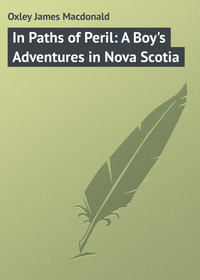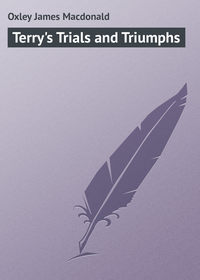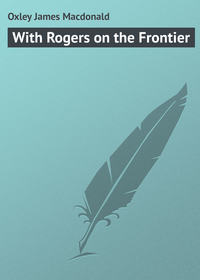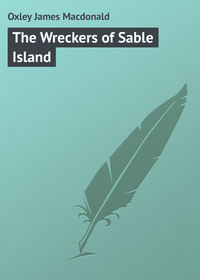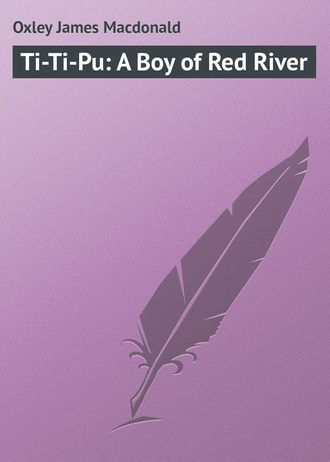 полная версия
полная версияTi-Ti-Pu: A Boy of Red River

J. Macdonald Oxley
Ti-Ti-Pu: A Boy of Red River
CHAPTER I
From the Old World to the New
This is how it befell. Thomas Douglas, Earl of Selkirk, thought that a flourishing colony right in the midst of the rich hunting-grounds of the Hudson's Bay Company, in which he was interested, would prove no less a benefit to the natives than an excellent thing for the colonists. Accordingly, he busied himself in persuading a number of his fellow-countrymen to leave their hillside farms, and, with their families, voyage to the unknown wilds of the New World.
Among those whose courage was equal to this enterprise was Andrew Macrae, accompanied by his good wife, Kirstie, his sturdy son, Hector, then just on the edge of his teens, his bonnie wee daughter, Ailie, and his two splendid sheep dogs, Dour and Dandy.
The dogs' names were not given them at random. They just fitted their natures. A more serious creature than Dour surely never stood upon four legs. He bore himself as if he were responsible, not merely for the occupants of the sheep-cote, but also of the cottage as well. He was never known to frisk or gambol, or to bark without due cause.
Dandy was the very opposite, as black as a raven, save for a superb snow-white shirt-front, which he managed to keep marvellously clean, and a few touches of golden-brown on his shapely head. He was only a little slighter than Dour, and as lively and frolicsome as the other was impassive. Although not quite the equal of Dour, Dandy was an excellent sheep dog, too, and many a cotter envied Andrew the possession of the two fine creatures.
Hector loved both dogs dearly, albeit he stood a trifle in awe of Dour. The dogs were as much members of the family as Ailie and himself. He would have shared his last bit of bannock or sup of 'parritch' with either of them, and they fully returned his affection, each in his own way.
Hector was a 'braw laddie,' in very sooth. From his father, he got the straightness and strength of body, the deftness of hand and foot, and the rapidity of thought that made him an unquestioned leader among his playfellows, and from his mother the light, crisp hair, the laughing blue eyes, and the happy turn of speech that made the other boys love as well as obey him.
He stood in much awe of his father, who was as strict as he was just, but his mother had his whole heart, and many a time did he go to her for comfort, when reproved by Andrew for some little bit of heedlessness.
With little Ailie, a dark-eyed, dark-haired sprite, not like either parent, to protect and pet, the Macraes made up a notably happy family group, and were the recipients of many attentions from their fellow passengers, on the long voyage on a slow sailing ship to the bleak shores of Hudson's Bay.
That voyage out proved far from being a pleasant holiday. Cooped up in an over-loaded vessel, whose accommodation was scant at best, fed upon pork and beef that was salter than the sea itself, and hard biscuits that became alive with weevils ere the ship reached its destination, all the colonists suffered more or less severely. It spoke well for the stamina of the Macraes that they bore the privations of the passage better than the majority, and landed at York Factory in fairly good trim.
'Eh, but glad I am to put my feet upon the solid ground again!' exclaimed Andrew Macrae, with heartfelt emphasis, as he sprang out of the boat and strode up the beach, and, in so saying, he spoke for every one on board the vessel.
Hector's legs wobbled under him in so absurd a fashion that he tumbled over several times in his first attempt at running, and even Dour and Dandy, for a little, seemed hardly to understand that they were free to bound away in any direction they pleased.
But presently all the colonists were landed, and, having been kindly welcomed by the Hudson's Bay Company's employees at York Factory, made haste to bestow themselves as best they might among the buildings of the fort.
The Macraes were fortunate in getting a snug room to themselves, and there, with their two children and faithful dogs, they settled down to await the beginning of the next stage of their long journey.
On the following morning, Hector, accompanied by Ailie, and having Dour and Dandy, went down to the beach, where there was much going on to entertain them.
The sailors were busy unloading the vessel of her very miscellaneous cargo, comprising tea and tobacco, sugar and salt, blankets and muskets, knives, hatchets, and all the varied articles required for provisioning the forts, or trading with the Indians, while Indians and half-breeds lounged near by, watching them with half-contemptuous interest. The Hudson's Bay officials moved briskly about, giving sharp orders, and, in and among them everywhere, were dogs of all ages and sizes, but alike in resembling wolves or foxes, for the Huskie breed was predominant.
The sheep dogs made no attempt to find favour with the others. On the contrary, they kept close to Hector, their gleaming eyes, curling lips, and bristling necks expressing in the clearest way what they thought of their new acquaintances. The latter were not long in showing their feelings in the matter. No sooner did the collies draw near them than they rushed to meet them, snarling and growling so ferociously that Hector began to feel a little alarmed, while Ailie shrank closer to him, clasping his hand tightly in hers, and murmuring: 'I'm frightened. They'll bite us.' 'They won't dare to,' responded Hector bravely, albeit his heart was thumping at a lively rate. 'I'll drive them off with my stick,' and he flourished gallantly a slender cudgel that he had picked up at the gate of the fort.
But the graceless Huskies had small respect for a stick when not in the hands of a man, and they closed in about the little group in a very menacing way. At last they got so close that Dour and Dandy, in their love and loyalty to the two children, could restrain themselves no longer, and, at the same moment, they flew at the throats of the two foremost assailants.
Instantly, there was a terrific uproar, the dogs barking and wrangling furiously, Hector shouting: 'Away, you brutes!' while he laid his stick stoutly upon the backs and heads of the Huskies, and poor little Ailie shrieked pitifully at what she believed to be the imminent peril of all four.
The collies fought superbly. Fearfully outnumbered as they were, their superior sagacity and speed of movement for a while enabled them to hold their own. Keeping close together in front of the children, they struck to right and left with their keen white fangs, slashing the Huskies on head and shoulder, so that one after another slunk away, howling dolefully.
But for each one thus driven off, two others rushed to the attack, and, in spite of the splendid play Hector made with his stick, at the risk of being badly bitten himself, the issue must have gone hard against the gallant collies, for the Huskies would not have stopped until they had torn them to pieces. But, in the nick of time, a stalwart figure came charging down the beach with mighty strides.
Into the thick of the melee plunged Andrew Macrae, using, with unsparing energy, not only his heavily booted feet, but his tightly clenched fists. On this side and that fell his tremendous blows, and every one meant a disabled or disheartened dog, until, presently, the whole pack had fled out of reach, and the wrathful Scotsman stood panting but triumphant, Ailie clinging sobbingly to one knee, and Hector standing breathless at the other, while Dour and Dandy, after a brief greeting, made haste to take stock of themselves, and see what damage they had suffered at the teeth of the evil-tempered Huskies.
CHAPTER II
At Odds with Bruin
'Ech, bairns!' exclaimed Andrew, putting a calming hand upon the head of each of the agitated children, 'but they're an ill lot of curs to set upon ye in that unmannerly fashion. I'm richt glad I heard the row they were making, and thocht that maybe Dour and Dandy might be glad o' my help. I'm sore mistaken if those snarling beasts,' and he indicated with a sweep of his hand the Huskies now hovering at a respectful distance, 'will be ettlin' to feel my foot verra soon. They're nae fules, though they don't know how to be decent to strangers.'
By this time Ailie's tears were stayed, and Hector had recovered his wind, so they continued along the beach, the collies keeping close to Andrew's heels, giving vent to triumphant little growls whenever a Huskie ventured within earshot.
As the sailing vessel had to lie out in the deep water, her cargo was being brought ashore in big boats, with high bows and sterns that could each carry a wonderful load. The process of discharging interested all the little party, and they were standing watching it, when one of their fellow-travellers came up, and, pointing to the boats, said: 'It's in those barkies that we're going to the Red River. I canna say I like the look of them ower much. They're right clumsy things, in my opinion.'
Before Andrew could make reply, Hector broke in with an eager 'Oh, are we truly going on those boats? Eh, but that will be fine! – won't it, Ailie?' And he gave his sister a hearty hug, just by way of expressing his joy.
His father smiled with grave indulgence. 'I would think ye'd had mair than enough of the water for a spell, laddie. I wonder ye're so eager to take to it again.'
'Eh, but that was in a big ship, father,' responded Hector, defending himself, 'and a boat will be different, and we will go along the river instead of on the ocean.'
'We'll see, we'll see,' said Andrew, sagely, 'the river may not be sae guid to us as you think.'
As the season was slipping by, and as it was important for the settlers to reach their destination in good time before the long winter came, the preparations for the remainder of the journey were hurried as much as possible.
Yet there seemed so much to be done, that September was at hand ere the little brigade of 'York boats,' with their precious freight of humanity and goods, hoisted their big sails, and moved slowly off up the river, amid a parting volley of cheers and good wishes from the people of York Factory, many of whom would have been glad enough to accompany them.
Hector was in the highest spirits. This method of travelling was altogether to his liking: no longer the cramping confinement of the sailing-ship, but the freedom of the roomy boat; no more tumbling about among the rude billows, but smooth gliding on the bosom of the river; no dreary waste of chill, gray water, but on either hand the well-wooded banks glowed with varied colour, the light yellow of the fading poplar contrasting with the dark evergreen of the spruce, while the willows of an intermediate hue seemed to shade the two tints into each other. Here and there the bright purple of the dogwood, the sombre brown of the dwarf birch, and the gay yellow of the shrubby cinquefoil gave richer notes of colour, while, to the keen-eyed, restless boy, there was ever the hope of some wild animal – a fox, a deer, or perhaps even a bear – being sighted as they advanced.
It was not all plain sailing, however. In some places, the current was so strong that it became necessary to resort to tracking. Only the women and children remained in the boat, while the men, taking hold of a line fastened to the foot of the mast, tugged and toiled along the river bank, one-half their number working at a time, and then being relieved by the other; thus dragging the clumsy craft forward at the rate of about two miles an hour.
Andrew Macrae did not shirk his share of the hard work, but of course Hector was not expected to join the trackers, and so, accompanied by Dour and Dandy, he scampered freely along the top of the bank, being bidden by his father not to roam out of sight.
For some time he obeyed this injunction implicitly. But, on towards mid-day, the collies caught a glimpse of something that caused them to dart off into the woods, barking furiously. Carried away by excitement, Hector followed them, running at top speed straight away from the river.
He could easily hear the dogs when he could not see them, and so, recking nothing of what might happen, he raced after them, until presently the change in their barking announced that whatever animal it was they had been chasing, they had brought it to bay.
A moment later, he came out into a little glade at the farther side of which a big black bear stood upon its hind legs, in front of a great tree, and made furious efforts to seize Dour and Dandy with its forepaws, or to deal them such buffets that they would never bark again.
It was a thrilling spectacle for the most experienced hunter, but for Hector, who had never seen any kind of a bear before, and whose generous heart was at once filled with anxiety for the dogs that were so dear to him, it simply made him forget himself entirely.
Rushing forward, he shouted: 'Leave them alone, you brute! Don't you hurt my dogs!'
Considering that the dogs must have started the row, by finding the bear in the first instance, this was rather unfair to Bruin. But Hector had no thought for the exact justice of the case. His one concern was for the dogs.
He had picked up a stout stick in the course of his ramble, and this he now swung above his head in threatening fashion, little knowing that, if he should venture within striking distance, the bear would not only parry his blow, but knock his ineffective cudgel out of his grasp as easily as though it were a feather.
Still shouting he hardly knew what, the fearless boy ran right up to the combatant and, so engrossed was Bruin with his two lively assailants, that he did not notice his coming until he was within a couple of paces of him.
Then he caught sight of his two-legged enemy, stared at him for a moment with manifest amazement, let forth an ominous growl, and, dropping upon all fours, made straight for him with open mouth.
Well was it for Hector that Dour and Dandy were not less strong than they were active and brave. They sprang upon the bear, one at either side of his head, and before he could shake himself free, Hector, not needing to be told that his only safety was in flight, had darted off at the top of his speed in the direction of the river.
In hot pursuit, the bear followed, with the dauntless dogs hanging to his flanks and greatly impeding his movements. Otherwise, clumsy creature though he seemed, he would soon have overhauled his quarry.
Happily, Hector was no less sure than he was swift of foot. There are few smooth places in the Highlands, and he had learned to race over the roughest ground without a stumble.
On he went, exulting in his own speed, even though deeply concerned for his own safety, and after him lumbered the bear, as fast as the faithful dogs would suffer him to move. Yet, hindered and harried as he was, Bruin steadily gained on the boy, as the latter could not help noticing. 'I maun climb a tree!' he panted. 'The creature will na get me there. Eh, that's a grand tree yonder. I'll rin for it.'
Changing his course slightly, Hector made for a stately pine that held out welcoming branches at a friendly height from the ground. If he could reach it and spring into them, he would be able to laugh at his fierce pursuer's futile efforts to reach him. Summoning all his fast waning strength for a supreme effort, he dashed towards the tree.
CHAPTER III
A Cold Plunge
Hector had all but reached the pine. In fact, one more stride would have brought him to its trunk, when his right foot slipped upon one of the outspreading roots, hidden under a carpet of smooth brown needles, and he pitched forward, narrowly escaping striking his head against the massive trunk.
He was little hurt by the fall, but he was very much dazed, and the bear might have had him in its deadly hug ere he could have recovered himself, had not a new actor appeared upon the scene. The boats had come to a halt to rest the men just about the time that Hector ran off after the dogs, and Andrew Macrae, noting the boy's disappearance, snatched up a gun and climbed the river-bank to see what had become of him.
'He's na here,' he exclaimed in surprise, as he stood looking all about him. 'Where can the feckless bairn ha' gone to?'
Just then his keen ears, trained not to miss the slightest sound, caught faintly the sharp barking of the two dogs. 'Eh! eh!' he muttered. 'They've started up some creature – maybe a squirrel or the like. I'll just run and see what they're doing.'
So, gun in hand, he set off at a long easy lope that was little slower than a horse's trot. As the barking came more strongly to his ears, he realized that something serious was taking place, and quickened his pace, until he had reached the limit of his powers.
But a few minutes of such exertion were required to bring him to the scene of action, and swinging around the pine tree, he arrived at the very crisis of his son's peril.
Throwing the gun to his shoulder, and not waiting to take careful aim, he fired just as the great black brute reared to strike at Hector. The whole charge of heavy buckshot took effect full in the bear's breast, and down he pitched almost upon Hector, but incapable of further harm.
Mr. Macrae's feelings were so mixed that he hardly knew how to express himself. He had been angry with Hector for straying away from the river-bank, but now he was naturally hugely proud of his own success as a bear killer, and this rose superior to his anger. Raising Hector to his feet, he said, mildly enough: 'Ye didna heed ma word, laddie,' and then added with swelling voice, 'eh, but it's a grand creature! Rin now to the boat, and tell the men to come and help me with it. I canna carry it back alone.'
Relieved beyond expression at his escape from the bear, and from his father's deserved reproof, Hector darted off, and presently returned with several of the men, who were all greatly interested in the big game Andrew Macrae had bagged.
Andrew was anxious that his 'gude wife' should see his noble prize, before it was skinned, and so he persuaded the men to help him take it down to the river.
The little party made quite a triumphal procession, with Hector proudly leading the way, the four strong men bending beneath the weight of their trophy, and the two dogs frisking and barking about them, evidently quite aware of the important part they had played in the business.
Of course, Hector's mother both scolded and coddled him, and little Ailie gazed with startled eyes at the motionless monster, and Dour and Dandy came in for unlimited praise and patting, which they accepted with their wonted dignity. Among the boatmen were those who knew exactly what to do with the bear, which was in superb condition, and the splendid skin having been carefully removed, the best part of the meat was saved to provide juicy steaks and cutlets for the travellers' table.
From the Hayes River, the boats turned into the Stool, and then into the Fox River, and later into the Hill River, which was the most rapid of all, and very difficult to work up against its opposing currents.
One of the worst places was Rock Portage, where the river, pent in by a range of small islands, formed several cascades, none of which could be ascended by the laden boats. It was, therefore, necessary to take out all the cargo, portage it across one of the islands, and then, by dint of tremendous toil, drag the big boat across the island, and launch it again above the cascade.
This sort of thing went on day after day, until at last, to the infinite relief of the tired toilers, they reached Oxford House, an important post of the Hudson's Bay Company, where a rest of several days was allowed for them to recuperate.
During all this toilsome progress, Hector never had a dull moment. He helped whenever he could, and when not required for this, found plenty to occupy his attention. He was the best of brothers to Ailie, taking her to play upon the bank, picking flowers for her, and pointing out the birds in the trees, and the tiny creatures that rustled through the dry grass. Often his mother would join in these little rambles, and then Hector's happiness was complete. He felt himself the man of the party, and assumed an air of importance that greatly tickled his shrewd, fond mother.
The halt at Oxford House was enjoyed by everybody. Here both ducks and trout were to be had in plenty and most of the men went either shooting or fishing. Andrew Macrae preferred the former, and, having succeeded in securing the loan of a canoe, with a half-breed to paddle it, took Hector off with him for a day's sport.
The weather was favourable, and Cross-Eye, the half-breed, who got the name from his eyes being on the bias, promised them plenty of ducks. They paddled up the lake for several miles until they came to a kind of enclosed bay, whose shores were lined with a thick growth of underbrush.
'In there we go,' said Cross-Eye, in his queer guttural tone, and the canoe was directed to a good landing-place. 'Hide him,' grunted the half-breed, and the light craft was lifted out of the water, and concealed among the trees.
They next proceeded to put themselves out of sight, there to patiently wait the appearance of the ducks. Mr. Macrae and Cross-Eye settled down comfortably. Not so Hector. He had absolutely nothing to do but search the sky for the black specks that would grow into the toothsome birds they sought, and, as none of these were visible, he naturally grew restless. He fired questions at Cross-Eye, in spite of the taciturn half-breed's surly responses, and he bothered his father with proposals to do this or that, none of which were approved.
At last he gave a cry of delight, at the same moment that Cross-Eye grunted in a relieved way. Far to the west, a thin black line showed faintly above the horizon, and rapidly grew more distinct. The ducks were coming at last.
Crouching close to the ground, and hardly breathing in their excitement, the three hunters awaited their approach. When the orderly array of winged voyageurs had come within reach of the sound, Cross-Eye proceeded to imitate their cries with a marvellous fidelity.
Hector was amazed at the sounds which issued from him. They were so perfectly bird-like.
Instead of flying over, the ducks hesitated, returned the cries that attracted their attention, and then, with much flapping of wings, dropped down upon the still surface of the little bay, right in front of their hidden enemy. The moment they were well within range, at a signal from Cross-Eye, the report of two guns rang out like one, and two ducks gave their last quack.
With wonderful quickness the half-breed had the canoe launched, but Hector was no less quick in springing into it, and off they went after the birds. A few powerful strokes brought them to where they lay upon the water.
'You get them,' grunted Cross-Eye, as he held the canoe steady, and Hector leaned over the side to pick up the ducks. It was not a difficult thing to do, but the sudden excitement after the wearisome waiting had flustered him. He was so eager to do his share of the work that he overdid it, and upset the canoe, throwing the half-breed and himself into the water.
Now there was nothing of the hero in Cross-Eye. He was both angry with Hector for his awkwardness, and alarmed about his own safety. So, without one thought of the boy, he made for the shore as fast as he could, in spite of Mr. Macrae's indignant appeals to him to help Hector.
As for the latter, he had not been born and bred beside a Scottish loch without learning to swim. Indeed, neither Dour nor Dandy could get faster through the water. But the ice-cold lake into which he had been so suddenly plunged was a different thing from the sunny loch in summer-time.
Before he had taken a dozen strokes towards the shore, the deadly chill laid hold upon him, and numbed his arms and legs until he could scarce keep his head above water. Indeed it did go under once, the water smothering the cry for help that his peril had wrung from him, ere his father, throwing off his coat, plunged in to his rescue.
CHAPTER IV
Hector Entrapped
Before Mr. Macrae had reached Hector, he, too, felt the paralysing effect of the glacial water. But he was a man of enormous strength, and, wallowing through it like a whale, grasped the boy firmly with his left hand, while he struck out for the canoe, which rocked upon the water in supreme indifference to their struggles for life.



